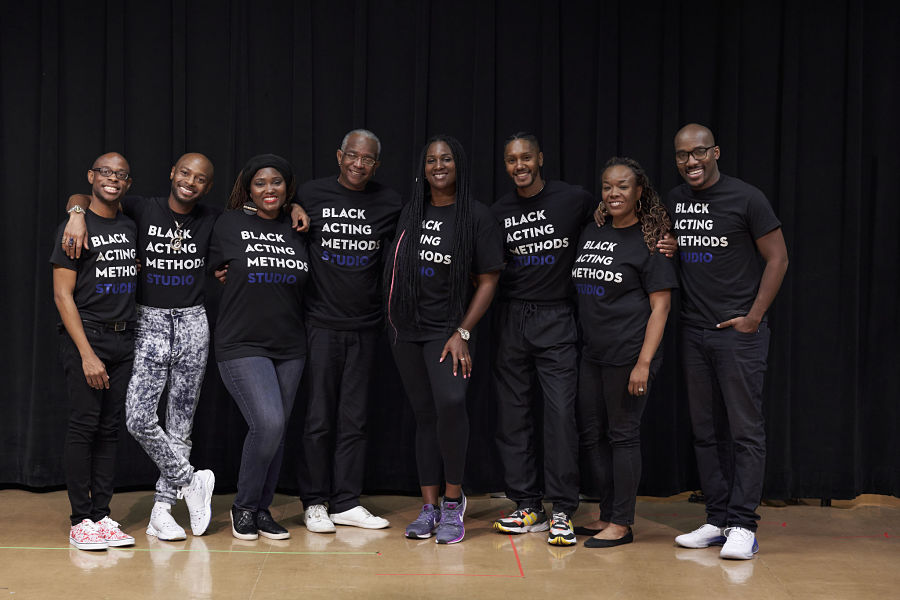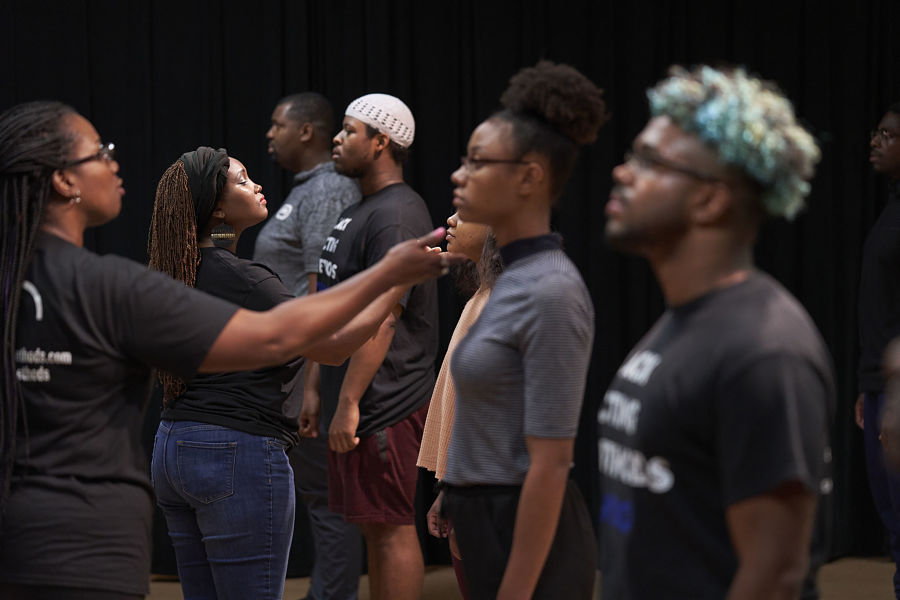Empowerment was a keyword at the 2019 Black Acting Methods Studio Symposium, an outgrowth of Sharrell D. Luckett and Tia M. Shaffer’s book Black Acting Methods: Critical Approaches (Routledge, 2017), held Sept. 6-7 in Atlanta. Using culturally responsive training techniques, the two-day symposium effectively contested actor training that centers white ideologies, with workshops, discussions, and networking responding to an American theatre tradition in which the Black voice, contributions, and success are absented, appropriated, and expropriated. The symposium also facilitated a ritual process through which actors could reconcile dominant Western binaries: mind and body, dance and drama, and acting and directing. And an Afrocentric workshop on mental health offered tools for use in the daily lives of actors who encounter disempowering situations.
The symposium opened on Friday evening with an invigorating dance workshop led by Juel D. Lane, executive artistic associate of the Black Acting Methods Studio. Accompanied by a djembe drum, Lane’s warm-ups built on yoga postures, emphasizing how “drama proceeds from movement and movement proceeds from drama.” Even a trip to Trader Joe’s or a workout at the gym can inform how we choreograph our movements both onstage and off, according to Lane. Severely testing the decades that have elapsed since I last took a dance class, I participated in the workshop, with positive results. Sweating profusely, my heart pounding my chest, I imprinted dance steps into my muscle memory for later use in performing and/or teaching at Fort Valley State University, where I am an associate professor of theatre and performance studies.
“The Studio and the Book,” billed as a community conversation, officially kicked off the symposium with an improvised call-and-response song performed by founding Studio team members Rahbi Hines and Samuel Collier. The session proceeded to introduce the remaining founding Studio team including Sharrell D. Luckett, the aforementioned Lane; Kashi Johnson, Jonathan M. Lassiter, and Tia M. Shaffer. Also in attendance were Shirlene Holmes, acclaimed playwright and mentor of the team members, as well as Freddie Hendricks of the Hendricks Method. Hendricks taught most of the founding team at Atlanta’s Tri Cities High School of Visual and Performing Arts and the Youth Ensemble of Atlanta.
Luckett and Shaffer first discussed Black Acting Methods: Critical Approaches as a text dedicated to Black actors who routinely experience racism when pursuing actor training and roles both nationally and globally. In addition to being the first compilation featuring acting methodologies centering black people, Luckett and Shaffer also consider the book’s title, Black Acting Methods, both a field of study and a (performance-based) movement growing exponentially, as actor training institutions around the world increasingly recognize the desire to incorporate this pedagogy in their training programs.
Next Studio members shared their experiences as either drama students trained by Hendricks or as Black Acting Methods practitioners. Most of the Studio team trained in the Hendricks method, which is principally based in devising original work to mirror students’ own excellence back onto them. Since Black people’s lineage always already involves deeply felt emotion and epic experience, the Hendricks method focuses on empowering students without scripts, keeping the work alive in the performers’ bodies and minds. Toward the end of the symposium, Hendricks remarked, “Greatness is inevitable when focus marries passion and the desire is just as strong as the need.”
Saturday’s sessions opened with a hip-hop theatre practices workshop led by Kashi Johnson, chair of the theatre department and professor at Lehigh University, and an artistic associate at Black Acting Methods Studio. Based on her pioneering Act Like You Know college theatre course, Johnson began orienting us to the session by reviewing the “four plus one” elements of hip-hop; MCing, DJing, graffiti, dance, and knowledge, reminding the participants, gathered to sit in a circle, that hip-hop values truth, authenticity, and community. We warmed up by choosing our MC names and learning to beatbox before we wrote our own rhymes, then separated into small groups to form our hip-hop “crews.” Workshop participants then performed for each other in small cyphers. Johnson’s workshop fostered empowerment by encouraging actors to perform their own material, privileging their own knowledge and voices.

Jonathan M. Lassiter’s workshop, “You Want Me to Do What?: Black Actors in White Spaces,” also facilitated empowerment by foregrounding an Afrocentric paradigm of psychology, offering tools and exercises for use when encountering disempowering situations. Lassiter said he defines mental health as “not only an absence of disease but means of self- actualization” through which we preserve, define, and enhance ourselves. In confronting multiple forms of oppression, Lassiter outlined a framework of time, rhythm, improvisation, orality, and spirituality (a.k.a. James M. Jones’s TRIOS theory), by which one can affirm oneself and “set yourself up for success.” A professor of psychology at Muhlenberg College and visiting assistant professor of medicine at the University of California, San Francisco, Lassiter directed an impressive session of self-care through self- awareness.
In the symposium finale, participants took part in a Hendricks Method workshop. Co-led by team members Lane, Hines, Collier, Luckett, and Shaffer, the Hendricks Method workshop warmed up performers’ bodies and voices through dance, song, and mantras. After preparing their bodies, symposium attendees shared what was on their minds, including their concerns about social issues. Using the Hendricks Method, which places value on listening to the actor and encourages them to devise performances based on their real-world concerns, participants devised material including songs, dance, rap, and acting, and shared their creations in the black box studio at Atlanta’s Southwest Arts Center. The high- energy, multidisciplinary performances shared by each group, accurately described as works of communal “genius,” punctuated the inaugural, but certainly not the last Black Acting Methods Studio Symposium. It was an experience never to be forgotten.
Maisha S. Akbar, Ph.D., is author of Preaching the Blues: Black Feminist Performance in Lynching Plays (Routledge, 2020) and an associate professor of visual and performing arts at Fort Valley University in Georgia.


